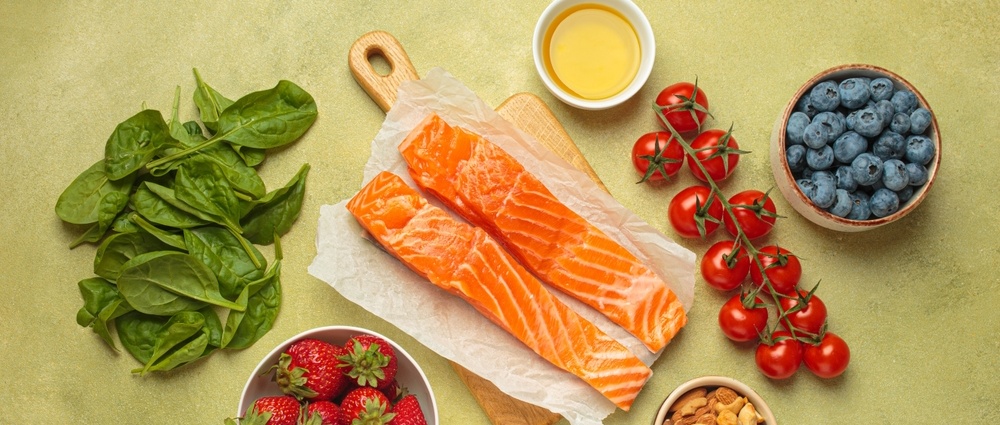
What foods are good for arthritis?
Peer reviewed by Dr Colin Tidy, MRCGPLast updated by Lynn StephenLast updated 17 Sept 2025
Meets Patient’s editorial guidelines
- DownloadDownload
- Share
- Language
- Discussion
What we eat can help to relieve the symptoms of many health conditions, including arthritis. Although there is no miracle diet for arthritis, certain foods can help fight inflammation and support your joint health, such as fatty fish, fruit, vegetables, and nuts.
In this article:
Video picks for Arthritis
Continue reading below
Why does your diet affect arthritis?
Arthritis is a common condition that causes pain and inflammation in a joint. Although there are many types, the two most common are osteoarthritis and rheumatoid arthritis.
Osteoarthritis
This tends to affect people over the age of 40, but it can occur at any age as a result of an injury. It affects the smooth cartilage lining of the joint, which causes stiffness and pain and makes movement more difficult.
This lining can become thinner, putting more pressure on other areas of the joint, including the tendons and ligaments. Severe loss of cartilage can lead to bone rubbing on bone and change the shape of the joint too, causing pain.
Rheumatoid arthritis
This is less common than osteoarthritis and typically starts when a person is between 30 and 50 years old. In rheumatoid arthritis, the body's immune system targets affected joints, which leads to pain and swelling. The outer covering of the joint is affected first, but the problem can spread and cause the bone and cartilage to break down too.
Martin Lau, Arthritis Action's dietitian and services development manager, says the relationship between diet and arthritis is complex. There are many reasons why what you eat can help with the symptoms.
Firstly, body weight can directly affect arthritis.
"Carrying more body weight is not good for any musculoskeletal condition such as arthritis," Lau says. "A landmark study found one pound of weight-loss lessens four pounds of pressure on the knees, per step."
One of the key symptoms of arthritis is persistent pain, but what we eat has the potential to ease the discomfort. In 2018, a systematic review of 72 studies examined the role of nutrition and persistent pain and found that it may be possible to reduce long-term pain with a healthy diet1.
Lau recommends a diet that includes colourful fruit and vegetables, wholegrains, and essential fatty acids, omega 3 and omega 6, such as those found in salmon.
"We should also avoid dehydration throughout the day, and limit ultra-processed food," he says.
Staying hydrated can help ease pain caused by inflammation in the joints. Around 80% of cartilage tissue - a connective tissue that protects your joints and bones - is made up of water. Drinking plenty of water helps nutrients travel within the tissue, which maintains healthy cartilage.
Best foods for arthritis
Back to contentsOily fish
Oily fish, including salmon, sardines, mackerel, and trout, contain long-chain omega-3 fats, which are important for overall health and can reduce inflammation and disease activity in people with rheumatoid arthritis. It's recommended that you have two portions of oily fish a week.
Nuts and seeds
Many nuts and seeds contain polyunsaturated fats - so-called healthy fats - as well as protein, vitamins, and minerals. They also contain linoleic acid (ALA), a type of omega-3 fatty acid with anti-inflammatory properties. Almonds, hazelnuts, peanuts, pecans, pistachios, and walnuts are all healthy options, but make sure you choose unsalted types.
Fruits and vegetables
Broccoli, cabbage, bok choy, and cauliflower all contain sulforaphane, a compound which studies indicate may act as an anti-inflammatory and help slow down cartilage damage in osteoarthritis.
Sweet potatoes, oranges, carrots, and red peppers contain beta-cryptoxanthin, a chemical with antioxidant properties that helps to fight inflammatory conditions such as arthritis.
Olive oil
Research suggests that the oleic acid and antioxidants in olive oil can help reduce inflammation. The antioxidants in olive oil may work in a similar way to the drug ibuprofen - an anti-inflammatory pain reliever.
Studies have also shown that olive oil significantly reduces joint pain, stiffness, and hand muscle grip in people with arthritis. Cooking food in olive oil rather than vegetable oil is a simple switch that may help boost your health. You can also add a teaspoon of olive oil to salads, sauces, or vegetables to boost your intake.
Whole grain foods
Whole grain foods, including whole grain bread and pasta, are rich in nutrients, fibre, and antioxidants, and have anti-inflammatory benefits.
Continue reading below
Foods to avoid with arthritis
Back to contentsSweets
It's important to avoid sugary foods, which may worsen symptoms of arthritis, such as pain and stiffness. A study involving 217 people with rheumatoid arthritis found that sugar-sweetened fizzy drinks and desserts were the most frequently reported to worsen symptoms of rheumatoid arthritis2.
Red meat
Eating a lot of red and processed meats has been linked to a higher chance of heart disease, cancer, and diabetes, and studies show that red meat may also worsen the symptoms of rheumatoid arthritis.
Highly processed foods
Ultra-processed items such as fast food, breakfast cereal, and baked goods are typically high in refined grains, added sugar, preservatives, and other potentially inflammatory ingredients, all of which may worsen arthritis symptoms.
Alcohol
As alcohol may worsen arthritis symptoms, anyone with inflammatory arthritis should restrict or avoid it. Drinking alcohol can increase uric acid levels - a waste product found in blood - which can increase the likelihood of inflammatory joint conditions, including osteoarthritis and gout.
Lau adds that it is important to think about your overall diet, rather than individual foods.
“The aim shouldn’t be to just eat one type of food or diet," he says. "But instead to eat a well-balanced diet and keep to a healthy weight.".
References
Back to contentsPatient picks for Arthritis

Bones, joints and muscles
Arthritis
Arthritis means inflammation in a joint (like your knee, hip, elbow or fingers). It is a common problem and generally affects older people, although there are some rare conditions that cause arthritis in children and teenagers. There are lots of types of arthritis. Some give you short-term aches in the joints and then resolve completely, others can cause long-term problems and permanently affect how your joints move. This leaflet will explain a bit about how joints work and then go through the main causes of arthritis in easy-to-read language.
by Dr Toni Hazell, MRCGP

Bones, joints and muscles
What's the difference between osteoarthritis and rheumatoid arthritis?
The most common types of arthritis are osteoarthritis and rheumatoid arthritis. The former is caused by wear and tear of your joints, while the latter is an autoimmune disease that affects otherwise healthy joints. How can you tell them apart?
by Amberley Davis
Continue reading below
Article history
The information on this page is peer reviewed by qualified clinicians.
Next review due: 17 Sept 2028
17 Sept 2025 | Latest version
25 Apr 2023 | Originally published
Authored by:
Lydia Smith

Ask, share, connect.
Browse discussions, ask questions, and share experiences across hundreds of health topics.

Feeling unwell?
Assess your symptoms online for free
Sign up to the Patient newsletter
Your weekly dose of clear, trustworthy health advice - written to help you feel informed, confident and in control.
By subscribing you accept our Privacy Policy. You can unsubscribe at any time. We never sell your data.